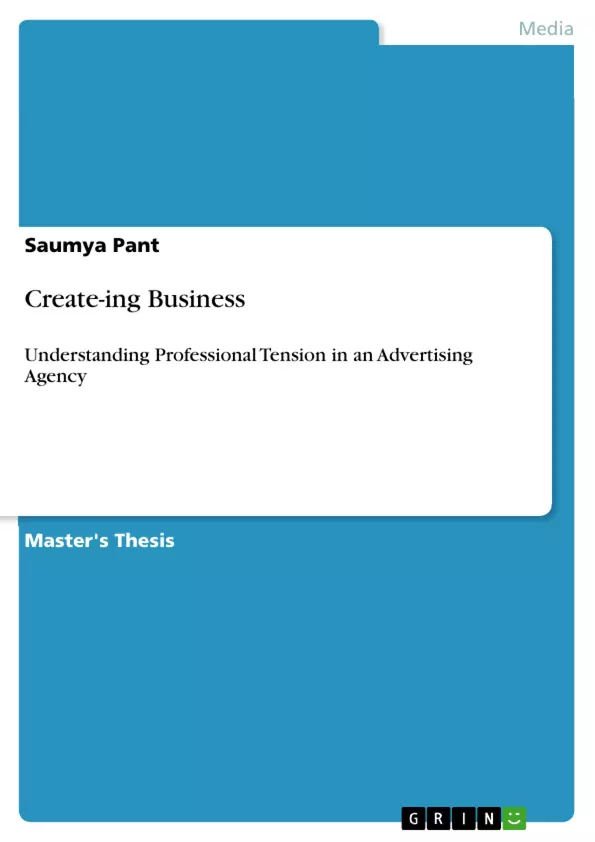This thesis concentrates on aspects of organisational culture in an advertising agency and how they help us in understanding professional tensions and conflicts. It applies concepts of organisational behaviour such as culture and identity to grasp reasons behind this professional tension. It challenges the common view of organisational culture, that is, it portrays culture as a form of normative control unlike the conventional notion of culture as the means of unison and conformity without resistance within an organisation.
Table of Contents
- Abstract
- Acknowledgements
Objectives and Key Themes
The research aims to understand professional tensions and conflicts within an advertising agency by examining organizational culture and its influence on the relationship between the creative division and management. It challenges the conventional view of organizational culture as solely a tool for conformity, instead exploring its role as a form of control.
- Organizational culture in advertising agencies
- Professional tensions between creative and management divisions
- Organizational culture as a control mechanism
- The relationship between organizational identity and culture
- The impact of organizational culture on resistance and conflict
Chapter Summaries
Abstract: This research explores organizational culture within an advertising agency and its connection to professional tensions and conflicts. It focuses on the ongoing conflict between the creative division and management, utilizing organizational behavior concepts like culture and identity to understand the underlying causes. The study challenges the traditional view of organizational culture as a tool for uniformity, highlighting its role as a control mechanism. A case study of a New Zealand-based advertising agency (Organization B) uses narrative analysis and rich pictures to uncover core assumptions, values, and beliefs, revealing how a seemingly "laid-back" culture can serve as a form of control, while agency members still actively resist through their pursuit of a creative identity. The research ultimately suggests that growing agencies must consider diverse perspectives within their structures, recognizing that cultural change is complex and that strong culture doesn't guarantee success or unity. A balance between creativity and strategic planning remains crucial.
Acknowledgements: This section expresses gratitude to various individuals who supported the author throughout their research journey, including family, friends, colleagues, and their supervisor. It highlights the crucial roles these individuals played in the completion of the thesis.
Keywords
Organizational culture, advertising agencies, professional tension, conflict, creative identity, management, control mechanisms, resistance, case study, New Zealand.
Frequently Asked Questions: Analyzing Professional Tensions and Conflicts in Advertising Agencies
What is the main focus of this research?
This research explores the professional tensions and conflicts within an advertising agency, specifically focusing on the relationship between the creative division and management. It investigates how organizational culture influences this relationship and challenges the traditional view of organizational culture as solely a tool for conformity.
What are the key themes explored in the research?
Key themes include organizational culture in advertising agencies, professional tensions between creative and management divisions, organizational culture as a control mechanism, the relationship between organizational identity and culture, and the impact of organizational culture on resistance and conflict.
What methodology is used in the research?
The research employs a case study approach, focusing on a New Zealand-based advertising agency. Narrative analysis and rich pictures are used to uncover core assumptions, values, and beliefs within the agency's organizational culture.
What are the key findings of the research?
The research finds that even a seemingly "laid-back" organizational culture can serve as a form of control. Agency members actively resist this control through their pursuit of a creative identity. The study suggests that growing agencies need to consider diverse perspectives and that strong culture doesn't guarantee success or unity. A balance between creativity and strategic planning is crucial.
What is the significance of the research?
The research contributes to the understanding of organizational culture, particularly in the context of creative industries. It highlights the complexities of managing conflict and fostering creativity within organizations, offering valuable insights for managers and researchers alike.
What are the keywords associated with this research?
Organizational culture, advertising agencies, professional tension, conflict, creative identity, management, control mechanisms, resistance, case study, New Zealand.
What does the research conclude?
The research concludes that a balanced approach is needed in advertising agencies to foster both creativity and strategic planning. It emphasizes the importance of considering diverse perspectives within the organizational structure and recognizing the complexities of cultural change.
What is included in the provided preview?
The preview includes the title, table of contents, objectives and key themes, chapter summaries (including the abstract and acknowledgements), and keywords.
- Citation du texte
- Saumya Pant (Auteur), 2008, Create-ing Business, Munich, GRIN Verlag, https://www.grin.com/document/186590



